From sore throats and headaches to indigestion and muscle pain, everyday ailments often strike when you least expect them. While modern medicine offers effective relief, home remedies remain a trusted, affordable, and natural way to ease mild symptoms.

This article explores proven home remedies for common health problems, explains how they work, and shares when to seek medical help — all based on traditional wisdom and current health research.
Table of Contents
- Why People Trust Home Remedies
- 1. Sore Throat and Cough
- 2. Headache and Migraine
- 3. Digestive Upset and Stomach Ache
- 4. Muscle and Joint Pain
- 5. Skin Problems (Cuts, Burns, and Rashes)
- 6. Common Cold and Flu
- 7. Sleep Problems and Stress
- Science-Backed Remedies Worth Trying
- How to Use Home Remedies Safely
- When to See a Doctor
- Conclusion
- FAQ: Home Remedies and Natural Health
Why People Trust Home Remedies
- Natural and accessible – You can find most remedies right in your kitchen.
- Budget-friendly – They cost less than over-the-counter drugs.
- Fewer side effects – When used correctly, many natural remedies are gentler on the body.
- Cultural roots – Herbal and traditional solutions have been passed down for generations.
Still, it’s important to remember that “natural” doesn’t always mean “risk-free.” The next sections explain safe and effective uses for common ailments.
1. Sore Throat and Cough
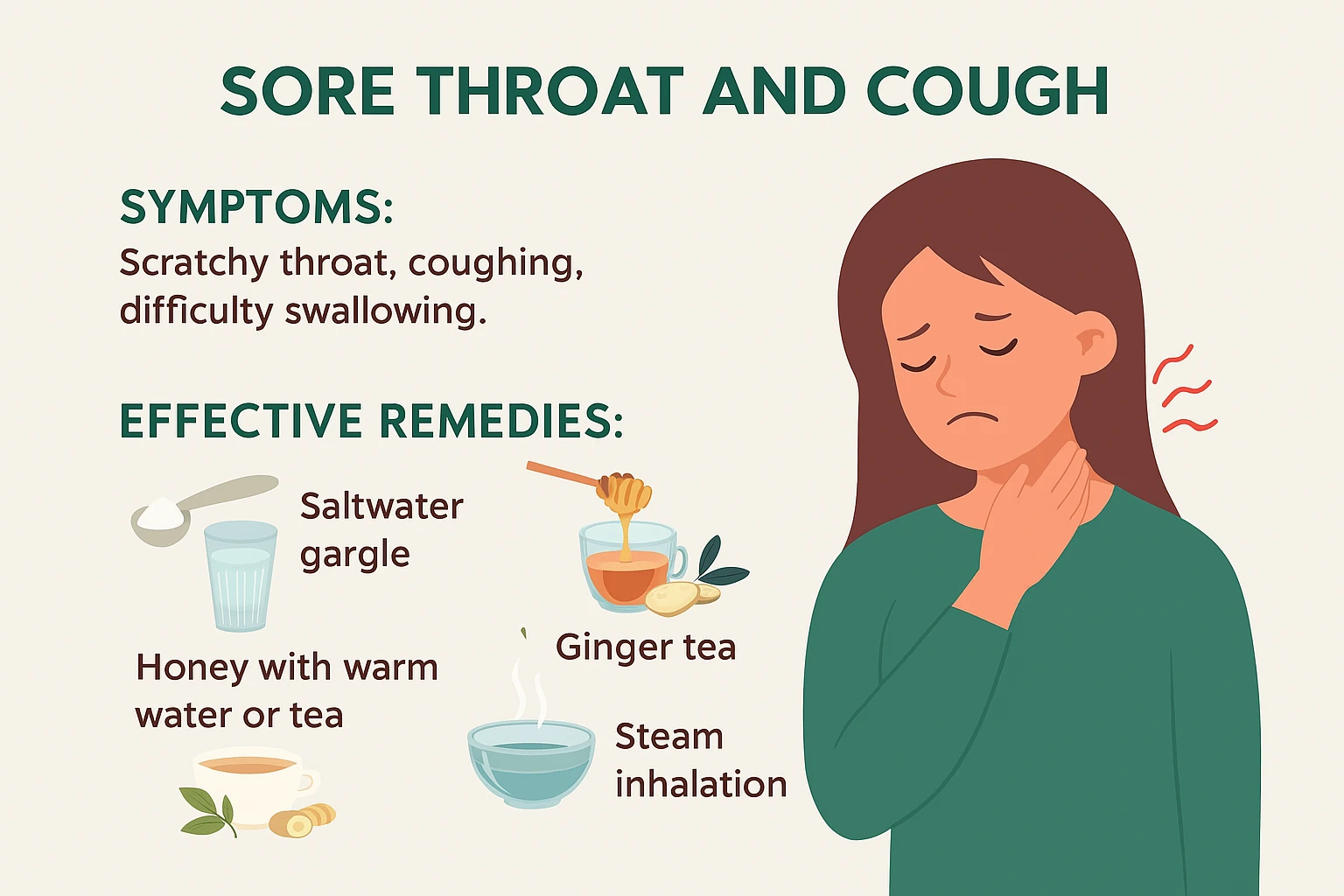
Symptoms: Scratchy throat, coughing, difficulty swallowing.
Effective Remedies:
- Saltwater gargle: Mix ½ teaspoon of salt in a glass of warm water and gargle twice daily. Helps reduce swelling and kills bacteria.
- Honey with warm water or tea: Soothes the throat and reduces coughing. (Avoid in children under 1 year.)
- Ginger tea: Steep sliced ginger in hot water to reduce inflammation. Add lemon or honey for extra relief.
- Steam inhalation: Inhale steam for 5–10 minutes to clear mucus. Add a few drops of eucalyptus oil if safe.
Seek medical help if:
The sore throat lasts more than a week, causes fever, or you experience breathing difficulty.
2. Headache and Migraine
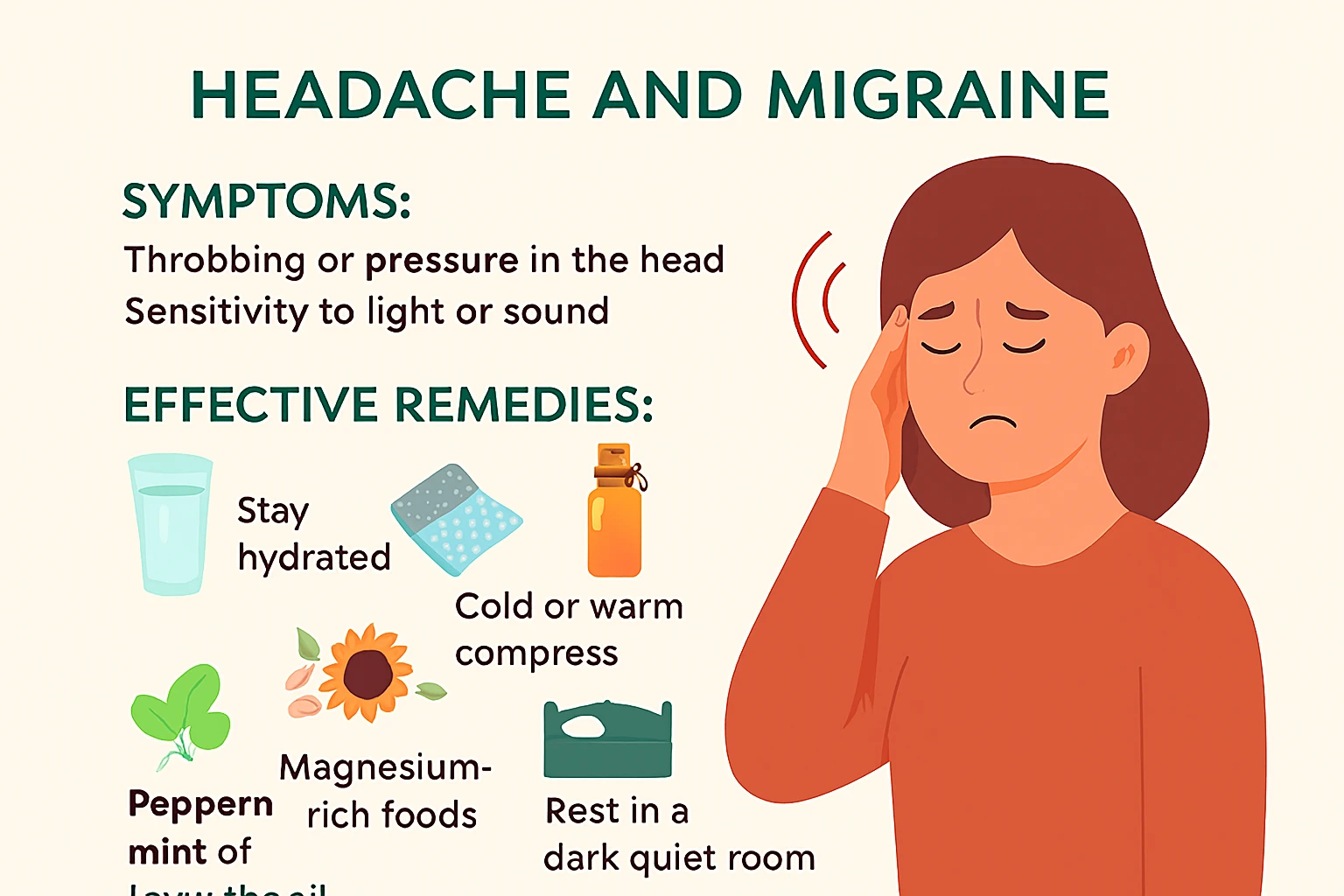
Symptoms: Throbbing or pressure in the head, sensitivity to light or sound.
Effective Remedies:
- Stay hydrated: Drink enough water — dehydration is a common trigger.
- Cold or warm compress: Cold packs ease migraine pain; warm compresses relax tension headaches.
- Peppermint or lavender oil: Apply diluted oil to temples for relaxation.
- Magnesium-rich foods: Include nuts, spinach, and seeds to prevent migraines.
- Rest in a dark, quiet room: Reduces sensory overload during attacks.
Seek medical help if:
You experience sudden, severe headaches or vision and speech problems.
3. Digestive Upset and Stomach Ache

Symptoms: Bloating, nausea, gas, or cramps.
Effective Remedies:
- Ginger: A natural anti-nausea and digestion aid — drink ginger tea or chew fresh ginger.
- Peppermint tea: Relieves gas and bloating by relaxing digestive muscles. (Avoid if you have acid reflux.)
- BRAT diet: Bananas, rice, applesauce, and toast help control diarrhea.
- Chamomile tea: Soothes stomach cramps and aids digestion.
- Probiotics: Yogurt and fermented foods help restore healthy gut bacteria.
Seek medical help if:
Pain is severe, lasts more than two days, or you notice blood in stool or vomit.
4. Muscle and Joint Pain
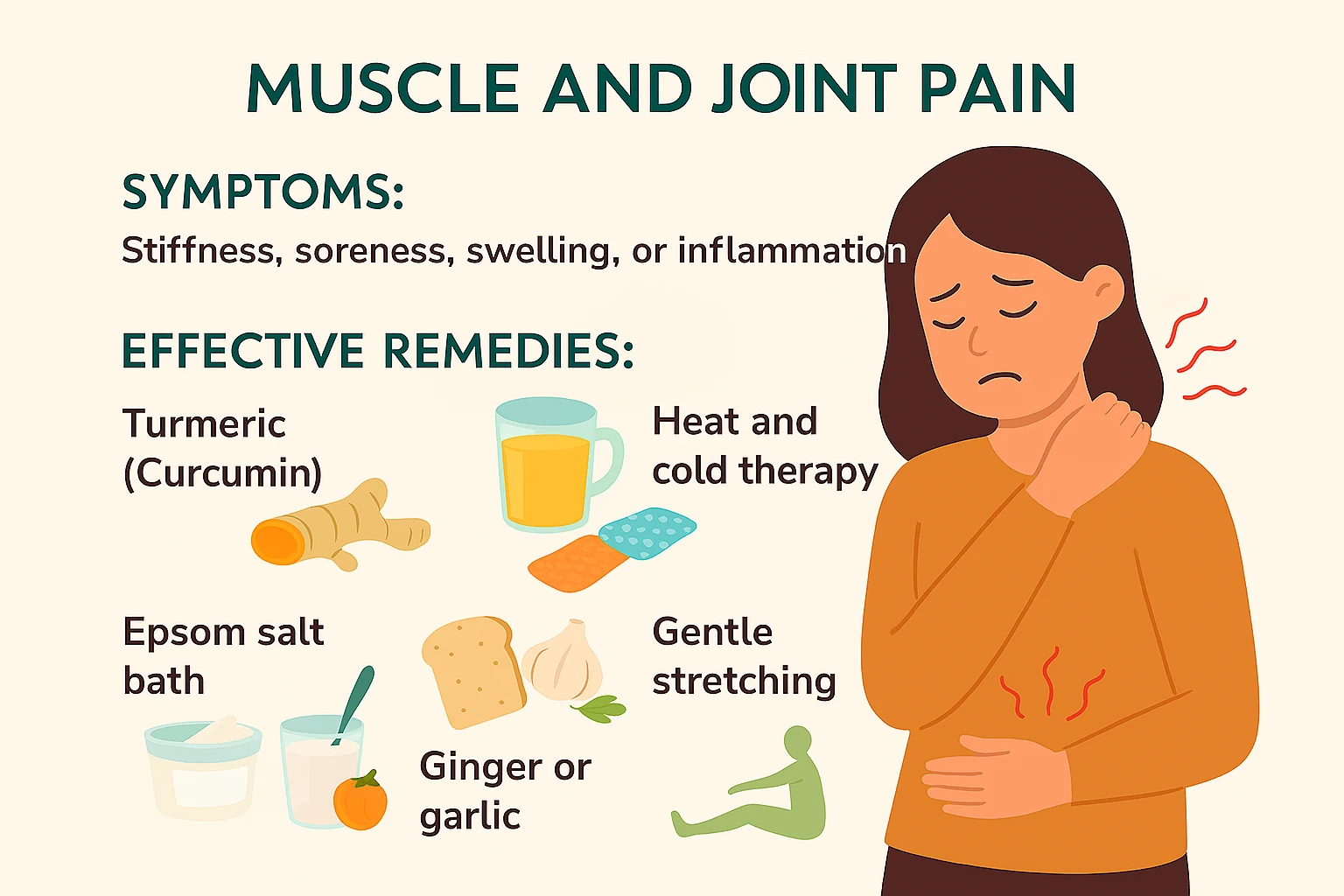
Symptoms: Stiffness, soreness, swelling, or inflammation.
Effective Remedies:
- Turmeric (Curcumin): Has anti-inflammatory properties. Add to warm milk or food with black pepper to enhance absorption.
- Heat and cold therapy: Ice for swelling; heat for stiffness or sore muscles.
- Epsom salt bath: Helps relax muscles and reduce pain.
- Ginger or garlic: May reduce inflammation when consumed regularly.
- Gentle stretching: Improves blood flow and flexibility.
Seek medical help if:
Pain is severe, persists beyond a week, or is accompanied by redness, swelling, or fever.
5. Skin Problems (Cuts, Burns, and Rashes)
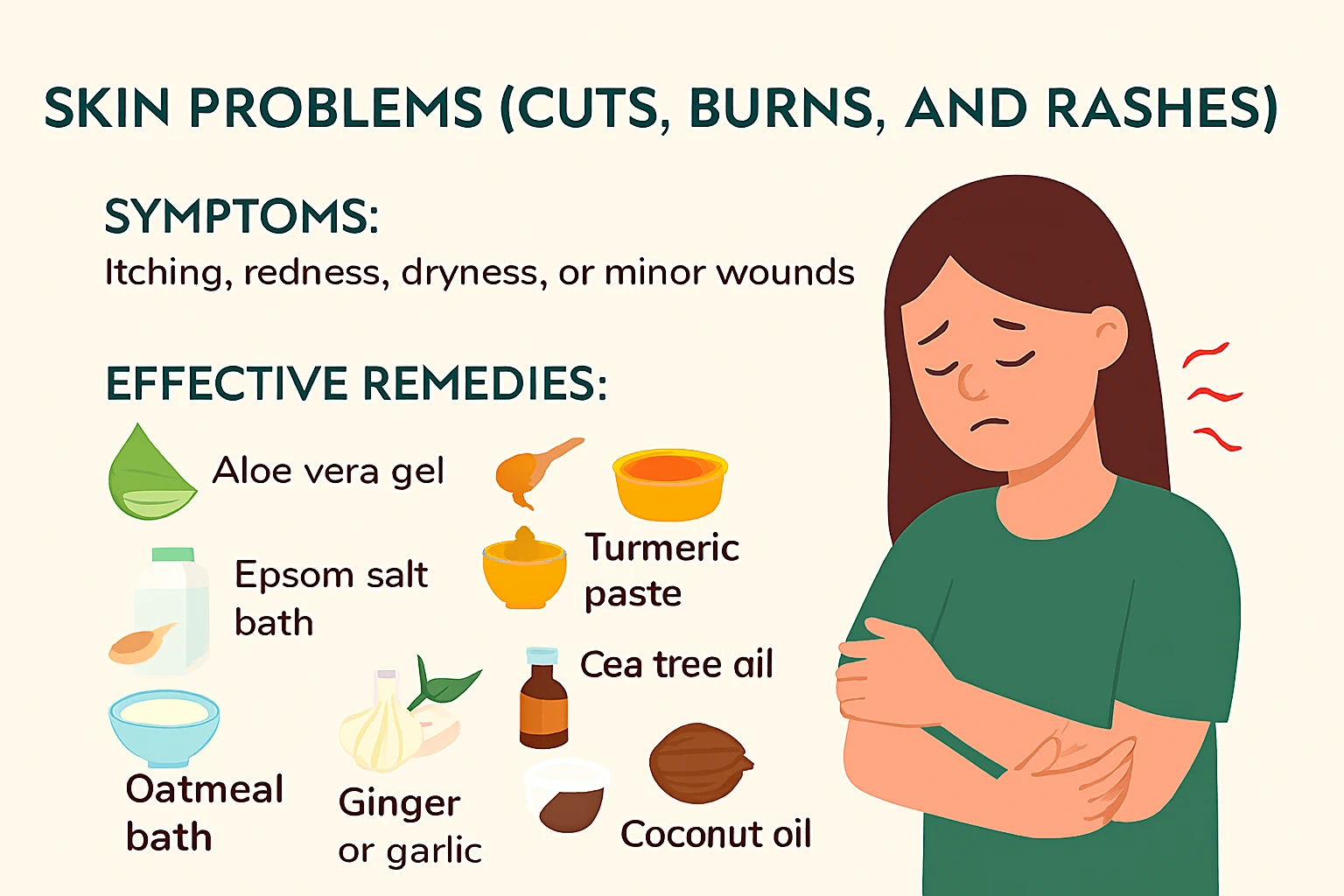
Symptoms: Itching, redness, dryness, or minor wounds.
Effective Remedies:
- Aloe vera gel: Cools and heals minor burns and skin irritation.
- Honey: A natural antibacterial used for minor cuts and wounds.
- Turmeric paste: Apply a small amount to minor cuts for its antiseptic benefits.
- Oatmeal bath: Soothes itchy skin and mild rashes.
- Tea tree oil: Dilute before use; helps with acne or fungal infections.
- Coconut oil: Moisturizes dry skin and helps minor irritations heal faster.
Seek medical help if:
The wound shows signs of infection, spreads rapidly, or causes significant pain.
6. Common Cold and Flu
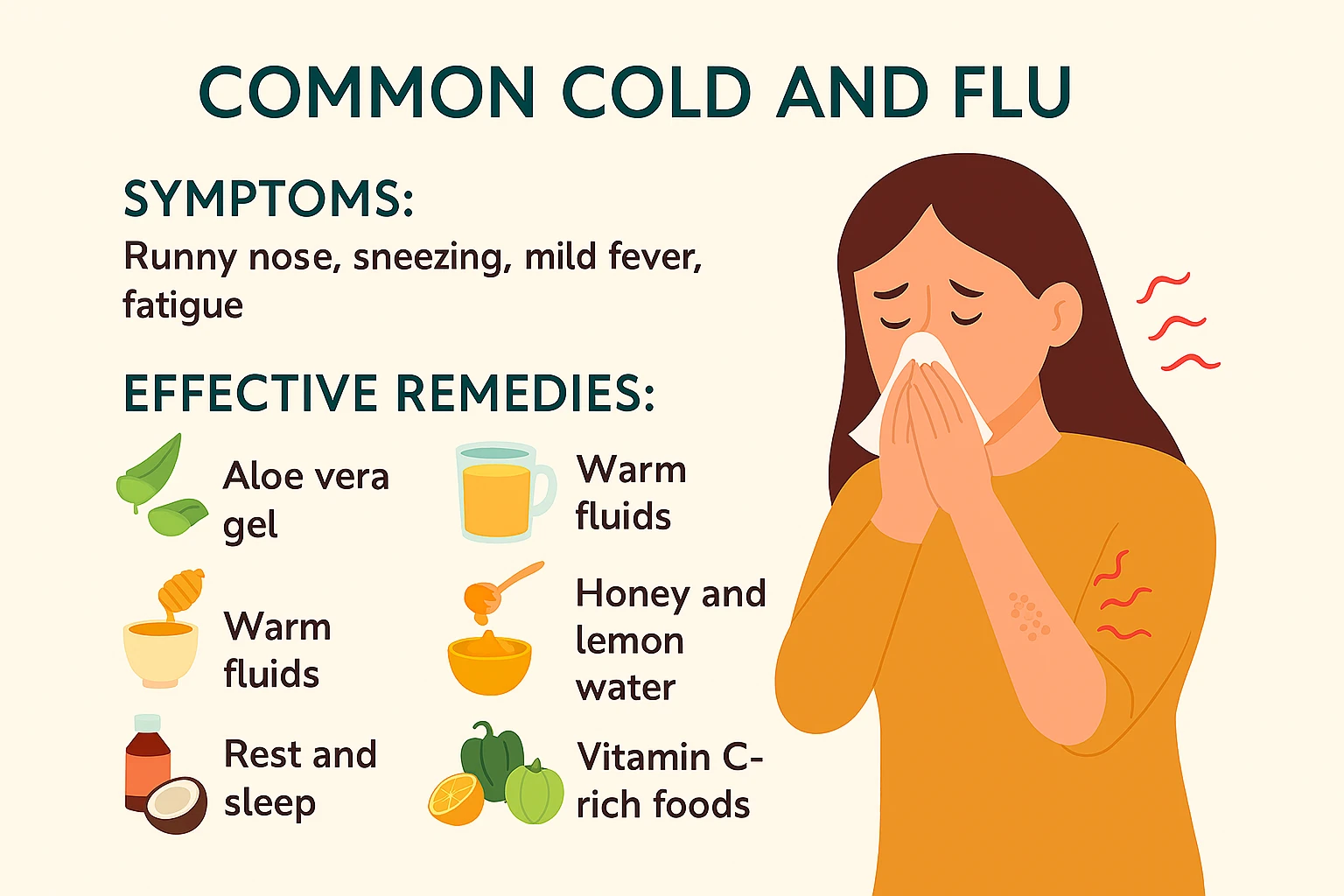
Symptoms: Runny nose, sneezing, mild fever, fatigue.
Effective Remedies:
- Steam inhalation: Clears nasal passages and relieves congestion.
- Warm fluids: Herbal teas and soups help maintain hydration.
- Honey and lemon water: Soothes throat irritation and supports immunity.
- Rest and sleep: Allow your immune system to recover faster.
- Vitamin C-rich foods: Citrus fruits, amla, and bell peppers boost immune function.
Seek medical help if:
Fever lasts more than three days or symptoms worsen instead of improving.
7. Sleep Problems and Stress
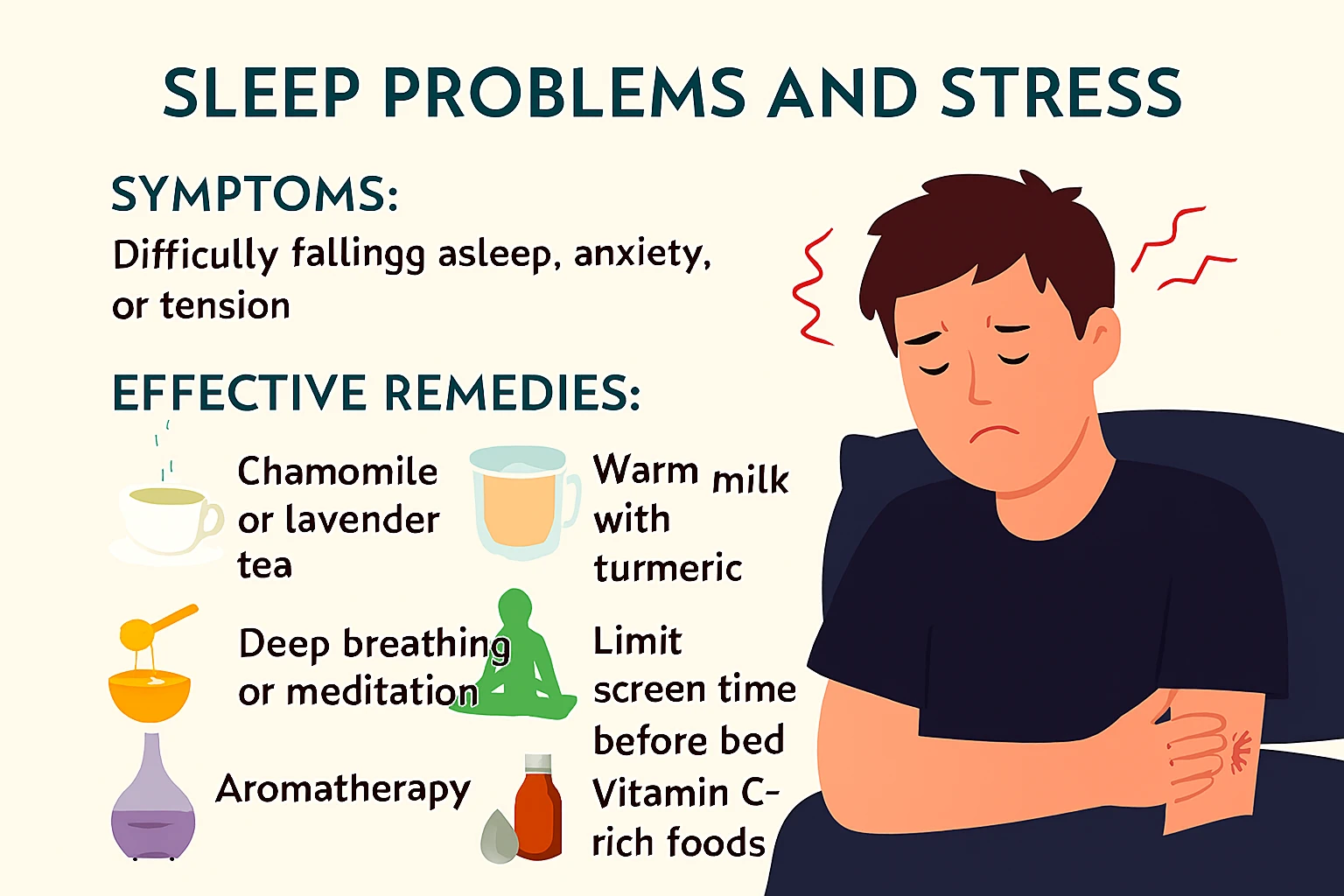
Symptoms: Difficulty falling asleep, anxiety, or tension.
Effective Remedies:
- Chamomile or lavender tea: Promotes calmness and better sleep.
- Warm milk with turmeric: Traditional bedtime drink that supports relaxation.
- Deep breathing or meditation: Reduces stress hormones and improves mental clarity.
- Reduce screen exposure before bedtime: The blue light from devices can interfere with your body’s natural melatonin production, making it harder to fall asleep.
- Aromatherapy: Diffuse lavender or sandalwood oil in your bedroom.
Seek medical help if:
Insomnia persists for weeks or affects daily functioning.
Science-Backed Remedies Worth Trying
- Turmeric (Curcumin): Anti-inflammatory and antioxidant benefits.
- Honey: Reduces cough frequency and throat irritation.
- Ginger: Proven to reduce nausea and digestive issues.
- Peppermint oil: Helps relieve IBS symptoms and headaches.
- Aloe vera: Aids skin healing and burns.
These work best as complementary remedies — not replacements for prescribed medication. For more on herbal supplements, check out this Mayo Clinic guide.
How to Use Home Remedies Safely
- Start small – Test a remedy in small amounts first.
- Avoid overuse – Too much of even natural remedies can cause harm.
- Check drug interactions – Especially with turmeric, garlic, or peppermint.
- Use clean, fresh ingredients – Avoid contamination.
- Discontinue use if irritation or allergic reactions occur.
When to See a Doctor
Seek medical advice if you experience:
- High fever lasting more than 3 days
- Severe or unexplained pain
- Difficulty breathing or swallowing
- Persistent vomiting or diarrhea
- Skin infections spreading quickly
- Blood in stool, urine, or cough
Conclusion
Home remedies for common health problems offer simple, natural, and low-cost ways to manage minor symptoms at home. From ginger and turmeric to honey and aloe vera, these time-tested remedies can bring quick relief and promote overall wellness when used correctly.
However, they are not replacements for professional medical care. Always use home remedies wisely, observe your body’s reactions, and consult a doctor when symptoms persist or worsen.
Balancing traditional remedies with modern healthcare helps you live healthier — naturally and safely.
FAQ: Home Remedies and Natural Health
1. Are home remedies safe for everyone?
Not always. Some remedies may cause allergic reactions or interact with medications. Always start with small amounts and consult your doctor if you have chronic conditions or are pregnant.
2. Can I use multiple home remedies together?
It’s best to use one remedy at a time. Mixing many ingredients may cause side effects or make it harder to identify what’s working.
3. Do home remedies really work?
Many have scientific backing — for example, honey for cough and turmeric for inflammation — but results vary by person and severity of the condition.
4. What’s the best home remedy for a sore throat?
A warm saltwater gargle and honey with lemon tea are among the most effective and soothing options.
5. Are essential oils safe for home use?
Yes, but always dilute them with a carrier oil and avoid ingesting. Some essential oils can cause skin irritation if used undiluted.
6. Can I use home remedies for children?
Some are safe (like warm compresses or saline water), but others — such as honey for infants under 1 year — can be dangerous. Always check age safety first.
7. How long should I try a home remedy before seeing a doctor?
If you see no improvement within 3–5 days, or symptoms worsen, consult a healthcare professional.
8. Do natural remedies expire?
Yes. Herbs, oils, and pastes lose potency or spoil over time. Store them properly and check for discoloration or smell changes before use.
Disclaimer
This article is for informational purposes only and should not replace professional medical advice, diagnosis, or treatment. Always consult a qualified healthcare provider before starting any new home remedy or supplement — especially if you’re pregnant, nursing, on medication, or managing chronic conditions.


